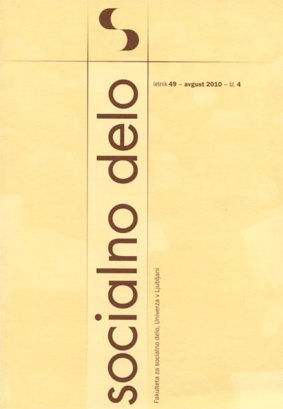
Revija Socialno delo
Socialno delo Journal is the only scientific periodical publication for social work in Slovenia. It's been published since 1961. From 2019, the journal adheres to open access format. Four issues are published per year: 1 (Jan-Mar), 2 (Apr-Jun), 3 (Jul-Sep), 4 (Oct-Dec). Abstracts are included in data bases: ERIH PLUS, International Bibliography of the Social Sciences IBSS), and EBSCO SocIndex with Full Text. The journal is published by Faculty of Social Work, University of Ljubljana. Journal is so-financed by Slovenian Research Agency (ARRS). Texts published in Socialno delo Journal are licenced under Creative Commons licence: CC BY-SA
ISSN 0352-7956
year 63, No.4
ARTICLES
Lea Lebar, Mateja Nagode
Assessing eligibility for long-term care in Slovenia - Pg. 263 - 278Keywords: social policy, eligibility assessment instrument, old people, social protectionThe scale for assessing eligibility for long-term care in Slovenia is presented; the scale is to be used within the framework of the Long-term care act. The paper critically evaluates the results of the scale by examining which applicants are not eligible for long-term care, presenting the distribution of applicants across the five categories of long-term care and identifying factors associated with a higher score on the scale in the five pilot sites. The data was collected as part of the Evaluation of the project »Transforming existing networks to provide community-based care services and programmes for old people«. The results show that 13.3% of applicants were not eligible for long-term care under the project. Factors associated with higher eligibility included: use of existing services, larger household size, higher dementia risk, urban setting, and male gender. Factors associated with a lower score were: marital status, i.e. single or divorced people receiving fewer points on average, and, to a lesser extent, older age. The concluding section places the results in the context of the long-term care system and suggests further steps for the implementation of eligibility assessment procedures.
Nadia Molek, Annemarie Gorenc Zoran
Double discrimination: intersectionality od gender and disability on labour market in Slovenia - Pg. 279 - 299Keywords: work setting, handicap, women, rights, violence, social justiceThe paper provides an assessment of the current knowledge on discrimination and violence against women with disabilities in work settings and highlights recent developments and future research opportunities in Slovenia in the field of the intersection of gender and disability in the labour market. The authors try to answer four research questions: (1) how has the approach to disability and gender evolved in academic studies?; (2) what are the most significant barriers women with disabilities face in the labour market?; (3) what impact have international and regional legal frameworks had on recognizing and addressing intersectional discrimination in the workplace?; (4) what state and civil society initiatives addressing discrimination and violence against women with disabilities in labour market exist in Slovenia and to what extent do labour laws and policies in Slovenia integrate an intersectional approach to protect women with disabilities in the labour market? The methods used are a critical literature review, and an analysis of international literature, frameworks, and policies related to discrimination and violence against women with disabilities.
Iris Dežman Burazer
Frequency of use of information and communications technology in social work with youth - Pg. 301 - 317Keywords: digital competencies, online counseling, ethical challenges, institutional support, digitalisationThe paper examines the current use of information and communications technology in social work with young people, highlighting the frequency of use and examining the factors that may influence it. Social workers frequently use basic ICT tools and perceive a gap between their own digital literacy and the digital competencies of young people. The research results indicate a weak positive correlation between self-assessed digital literacy and the frequency of ICT use. The research also showed that the number of perceived challenges is not related to the frequency of ICT use, while institutional support is partially positively associated with use. The study emphasizes the need for a systematic approach to developing digital competencies in the profession and improving institutional support for ICT use.
Bor Zavrl
Elements of social work in protection nurses' activities in Slovenia - Pg. 319 - 331Keywords: nursing, nurse, social medicine, public health, social care, educationThe author studies the topic of social work in the period between the two world wars, or the role of the predecessors of nurses, protection nurses in social work in Slovenia. Until the establishment of the School for Social Workers in Slovenia in 1955, there were no formally educated social workers despite the fact that the need for social work was great during this period. The roles and tasks of social workers were performed by some officials, functionaries and members of various societies and organizations, nuns, benefactors and also protection nurses. The paper explores what exactly these protection nurses did and how they responded to the needs for socialization of medicine and how they provided a bridge between hospitals and public care. The process of establishing formal education for professionals for social assistance and support is also described.
